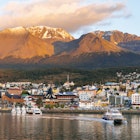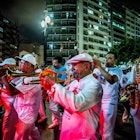
Nov 21, 2024 • 5 min read

The spectacular Kaieteur Falls in Guyana.
Culturally connected to the Caribbean, this under-the-radar South American country is 90% rainforest and a great place to see unspoiled nature and incredible waterfalls.
With that much beauty surrounding you in Guyana, it's easy to feel a connection to nature and this country.
Writer Carinya Sharples maps out a seven-day itinerary to take you from the city into nature.

I’m a freelance writer who was born and raised on stories of Guyana, where my dad hails from. I decided to spend a few months getting to know the country – and ended up staying more than three years, working as a journalist and teacher. There’s nowhere quite like it in terms of the richness of cultures, landscapes and foods. All this – and the lovely people I met – keep calling me back.

Note: Since Guyana began drilling for oil in 2019, accommodation prices have gone up sharply. You won’t find cheap youth hostels here, but a limited number of budget options are available.
If you’re looking for a place to switch off and reconnect – not just to the wonders of nature but to a different pace of life – you need to go to Guyana. Think slinking jaguars and giant anteaters; vast, green rainforests; rustic Indigenous eco-resorts; delicious servings of curry and roti; quaint wooden houses on stilts; and public statues commemorating historic rebellions by enslaved Africans and indentured Indians. As the only country in South America with English as its official language, Guyana surprisingly attracts fewer than 400,000 tourists a year. But those numbers are rising as the word gets out – so the time to go is now.

In the capital, Georgetown, start by powering up for the day with fresh, fluffy “bakes” (a kind of fried-dough bun) and saltfish sautéed with onions, garlic, tomato and pepper ($4) at Oasis Café, where locals and visitors go to chat, drink coffee and use the free wi-fi. From here, walk down Carmichael St to St George’s Cathedral, an oasis of calm in the city that’s said to be one of the world’s tallest wooden churches. Cross over Ave of the Republic to the craft stalls of Hibiscus Craft Plaza, where you can pick up locally made leather sandals and bags (one of the oldest trades in Guyana), Indigenous crafts and other souvenirs. If you’re in the mood, pop across to the slightly outdated but free Guyana National Museum (the life-size model of a giant sloth is a highlight).
Further up the street, you’ll find yourself in the rush of Georgetown’s iconic Stabroek Market – a red, cast-iron structure with a giant clocktower. Dodge the minibuses to see the stallholders selling everything from fruits to sweet bread rolls, then escape the midday sun in the upstairs restaurant of Hack’s Halaal on Commerce St or at local favorite Shanta’s on Camp St for curry with dal puri or roti and a local fruit juice. While you’re in the area, check out the beautiful (though somewhat dilapidated) City Hall, built during the 19th century in Gothic Revival style; and the Queen Victoria statue outside the nearby High Court – whose missing nose and hand were blown off during an anti-colonial protest in 1954, when Guyana was still under British rule.
Head back to refresh at your hotel: Rima Guesthouse for budget travelers, Herdmanston Lodge for midrange accommodations. (Note that since Guyana began drilling for oil in 2019, accommodation prices have gone up sharply. You won’t find cheap youth hostels here, but a limited number of budget options are available.) Then, head back out for fresh meat and seafood at FireSide Grill n Chill, or a Guyanese take on fish and chips (think plantain fries and well-seasoned fish and batter) at open-air Nicky’s Fish Shop.

Set out for adventure. A trip to Guyana isn’t complete without a visit to Kaieteur Falls – a stunning, roaring, force of nature where you’ll take in lush greenery, small golden frogs and captivating folktales told by your guide. Book in advance with Evergreen Adventures and pair your trip with the smaller Orinduik Falls ($350 for a full day trip, from 9am to 5pm).
If you’re a very early bird, you could even squeeze in a quick visit to Plaisance before you check in. Just five minutes’ drive from Ogle Airport, this is the birthplace of Guyanese legend Eddy Grant, the genius behind hits such as “Gimme Hope,” “Jo’anna” and “Electric Avenue.” Plaisance was also one of the first villages in British Guiana to be bought by former enslaved Africans after full emancipation in 1838. By pooling money and resources, such communities were able to take ownership over the plantation land on which they had toiled for free for so many years. Few markers of this history exist today – although a newly developed tour (“A Taste of Freedom Tour”) seeks to redress the balance.
After a day exploring Guyana’s famous falls, sample some home-cooked Guyanese food at cozy private-dining spot Backyard Café (around $25), whose chef Delven Adams gave visiting Gordon Ramsay a crash course in Guyanese cooking. If you can’t get a reservation, try the nearby (and cheaper) Back Yard Barbecue & Grill, an easily missed gem on the busy main road where the welcome is warm and the food excellent (try the grilled snapper or coconut-milk infused cook-up rice if either is on the menu).

The only thing better than flying over Guyana’s interior is going through it. If you’re on a budget, take a private minibus inland, through the rainforest that covers some 85% of the country, to the small town of Lethem (around $75). Bumping along for 12 to 16 hours isn’t an easy ride, yet there’s nothing to beat the feeling of emerging from the dense, green forest into the wide, open savannas and mountains that cover much of the southern part of Guyana. You might even catch sight of a jaguar, anteater or agouti (a small, guinea pig-like rodent) on the trail. Alternatively, hop on the plane and cross the country in about one hour (around $290).
In the interior of Guyana, particularly the North and South Rupununi regions, you’ll find a number of eco-lodges dotted across different river, forest and savannah landscapes, from former cattle ranches to a scientific research center. Rewa Eco-Lodge has garnered awards and recognition for its community-run approach and conservation work. Arrange with the venue for a pickup from Lethem; once you’re there, there’s no shortage of activities, from nature trails to catch-and-release fishing on the mighty, protected Arapaima. Given the distance getting there and things to do, one night just isn’t enough.

Depending on when you arrive back in Lethem, take a bit of time to explore this border town, directly adjacent to Brazil (you can even walk over a bridge into neighboring Bom Fim). Lethem is a pretty sleepy place – apart, that is, from Eastertime, when vaqueiros (cowboys), Guyanese from Georgetown and Brazilians all descend for the annual Rupununi Rodeo. This small, rough-and-ready shindig puts you right in the heart of the action, with bareback horse and bull riding, calf and sheep roping, and even a greasy pig race – topped off with some tasty indigenous home brews, the odd beauty pageant and stetsons galore.
Before you catch your flight or bus back to Georgetown, take an excursion to the nearby Moco Moco Falls, a former hydropower site with 999 steps leading up to the mountaintop, or Kumu Falls, a small waterfall with a series of small, natural pools to relax in. On your return to Georgetown, get back into the city groove over cocktails, burgers and live music at Kosmos, one of the trendy restaurants at the (still relatively new) MovieTowne complex, which even includes a Hard Rock Café.

Start the day early (if you can manage to, after the busy last few days) at the bustling Bourda Market. Sample some of the local fruits in season – look for sweet soursop, honey-like sapodilla and juicy mangos – before exploring the indoor section of the market, where you’ll find all manner of natural medicines and herbs; fresh and saltfish; and other daily essentials. While you’re there, pop into the adjoining Guyana Store, which sells such locally made products as cassava bread, hot pepper sauce and fresh coconut oil.
Party the night away at long-running but always popular bar-club-restaurant Palm Court, rooftop open-air Altitude Bar or The Strip, a small parade of bars next to nearby Giftland Mall.

Sunday is the day to “lime” (or chill) in Guyana. As there are few beaches beyond what’s known locally as 63 Beach (and the small patch of sand behind the Marriott Hotel), most people head for a river or creek. If you’re up early, start the day with some dawn birding and manatee spotting in the ponds of the Botanical Gardens. Then make your way by taxi and/or minibus to Pandama Retreat, an artsy forest hideaway about an hour out of Georgetown, where you can take a dip in cool creek water before tucking into a delicious lunch and some of the wines made on site from local fruits including mango, the berry-like jamoon and juicy red cashew. (Be sure to book in advance; $29 for the full day.)
Head back into town by 4pm to skip the traffic, then drop your belongings off and make for the seawall. Come Sunday evening this usually quiet (and sometimes dodgy) spot comes alive with a bouncy castle; food vendors selling everything from Venezuelan arepas to fish and chips; drinks stands; and blasts of soca, reggae and dancehall music. It’s the perfect place to toast to a marvelous trip – and start planning when you’ll be coming back…
Want to head to Guyana but wish there was someone to plan this out for you? Let Lonely Planet’s sister company Elsewhere take away some of the stress of planning by connecting you with the best local expert to craft your dream trip.


Nov 21, 2024 • 5 min read






